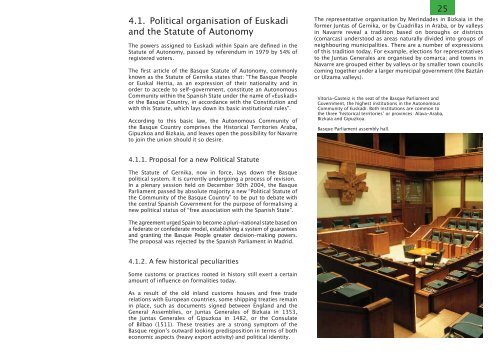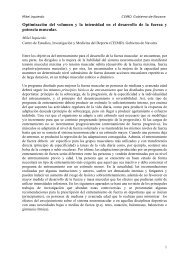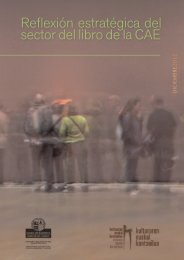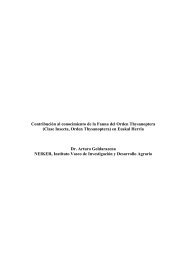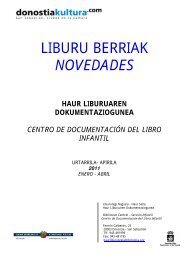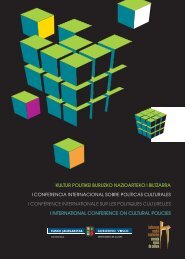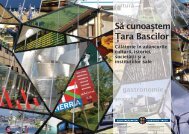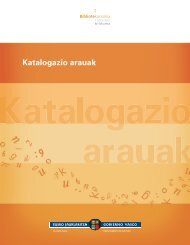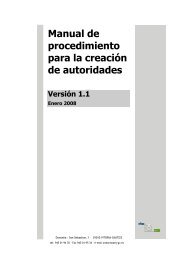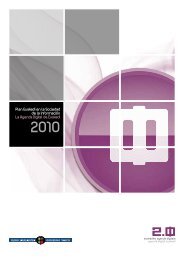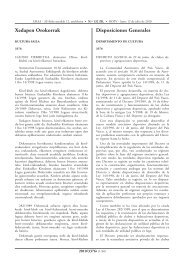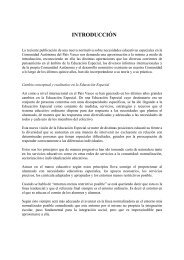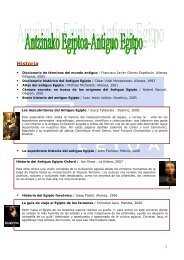The Basque Country (pdf, 4,3Mb) - Kultura Saila - Euskadi.net
The Basque Country (pdf, 4,3Mb) - Kultura Saila - Euskadi.net
The Basque Country (pdf, 4,3Mb) - Kultura Saila - Euskadi.net
Create successful ePaper yourself
Turn your PDF publications into a flip-book with our unique Google optimized e-Paper software.
4.1. Political organisation of <strong>Euskadi</strong><br />
and the Statute of Autonomy<br />
<strong>The</strong> powers assigned to <strong>Euskadi</strong> within Spain are defined in the<br />
Statute of Autonomy, passed by referendum in 1979 by 54% of<br />
registered voters.<br />
<strong>The</strong> first article of the <strong>Basque</strong> Statute of Autonomy, commonly<br />
known as the Statute of Gernika states that: “<strong>The</strong> <strong>Basque</strong> People<br />
or Euskal Herria, as an expression of their nationality and in<br />
order to accede to self-government, constitute an Autonomous<br />
Community within the Spanish State under the name of «<strong>Euskadi</strong>»<br />
or the <strong>Basque</strong> <strong>Country</strong>, in accordance with the Constitution and<br />
with this Statute, which lays down its basic institutional rules”.<br />
According to this basic law, the Autonomous Community of<br />
the <strong>Basque</strong> <strong>Country</strong> comprises the Historical Territories Araba,<br />
Gipuzkoa and Bizkaia, and leaves open the possibility for Navarre<br />
to join the union should it so desire.<br />
25<br />
<strong>The</strong> representative organisation by Merindades in Bizkaia in the<br />
former Juntas of Gernika, or by Cuadrillas in Araba, or by valleys<br />
in Navarre reveal a tradition based on boroughs or districts<br />
(comarcas) understood as areas naturally divided into groups of<br />
neighbouring municipalities. <strong>The</strong>re are a number of expressions<br />
of this tradition today. For example, elections for representatives<br />
to the Juntas Generales are organised by comarca; and towns in<br />
Navarre are grouped either by valleys or by smaller town councils<br />
coming together under a larger municipal government (the Baztán<br />
or Ulzama valleys).<br />
Vitoria-Gasteiz is the seat of the <strong>Basque</strong> Parliament and<br />
Government, the highest institutions in the Autonomous<br />
Community of <strong>Euskadi</strong>. Both institutions are common to<br />
the three ʻhistorical territoriesʼ or provinces: Alava-Araba,<br />
Bizkaia and Gipuzkoa.<br />
<strong>Basque</strong> Parliament assembly hall.<br />
4.1.1. Proposal for a new Political Statute<br />
<strong>The</strong> Statute of Gernika, now in force, lays down the <strong>Basque</strong><br />
political system. It is currently undergoing a process of revision.<br />
In a plenary session held on December 30th 2004, the <strong>Basque</strong><br />
Parliament passed by absolute majority a new “Political Statute of<br />
the Community of the <strong>Basque</strong> <strong>Country</strong>” to be put to debate with<br />
the central Spanish Government for the purpose of formalising a<br />
new political status of “free association with the Spanish State”.<br />
<strong>The</strong> agreement urged Spain to become a pluri-national state based on<br />
a federate or confederate model, establishing a system of guarantees<br />
and granting the <strong>Basque</strong> People greater decision-making powers.<br />
<strong>The</strong> proposal was rejected by the Spanish Parliament in Madrid.<br />
4.1.2. A few historical peculiarities<br />
Some customs or practices rooted in history still exert a certain<br />
amount of influence on formalities today.<br />
As a result of the old inland customs houses and free trade<br />
relations with European countries, some shipping treaties remain<br />
in place, such as documents signed between England and the<br />
General Assemblies, or Juntas Generales of Bizkaia in 1353,<br />
the Juntas Generales of Gipuzkoa in 1482, or the Consulate<br />
of Bilbao (1511). <strong>The</strong>se treaties are a strong symptom of the<br />
<strong>Basque</strong> regionʼs outward looking predisposition in terms of both<br />
economic aspects (heavy export activity) and political identity.


